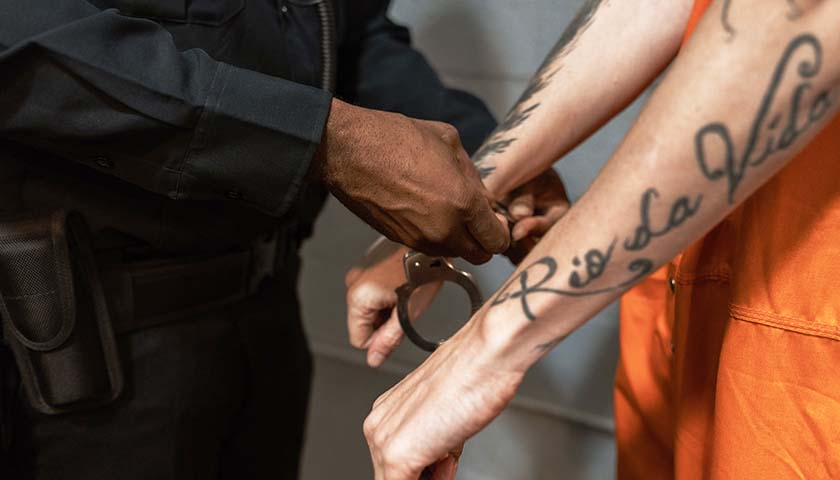by Jeff Minick
“Bad boys, bad boys, whatcha gonna do? Whatcha gonna, whatcha gonna do when they come for you?”
That song and those words used to open the show Cops along with scenes of the police chasing down and arresting the “bad boys.” Viewers assume those apprehended would be spending some time in the slammer.
Today? Not so much. We seem to have more crime than ever, and those who commit the crimes simply cycle through the revolving door of the criminal justice system, hurting those of us who are still law-abiding.
In the last two years, media personalities have described violent riots as “mostly peaceful protests.” Our collapsing border with Mexico is awash in criminals and drugs. Criminal gangs loot and rob retail establishments ranging from 7-Elevens to major shopping outlets. Car jackings have exploded in some cities. Philadelphia, for example, witnessed 90 car jackings in the first two weeks of 2022.
Murders have also skyrocketed during this time, breaking records in cities around the country.
And now criminal gangs are even looting freight trains, breaking into the containers and stealing massive numbers of packages. If you ordered some jewelry from Amazon for your sweetheart for Christmas, and it still hasn’t arrived, odds are good that the box in which it was shipped is torn open and lying beside some railroad track in Los Angeles.
Some in our government—from the feds to the locals—seem oblivious to these outrages. Others seem puzzled or ignorant, believing, for instance, that more gun control will reduce crime, closing their eyes to the fact that our most violent cities like Chicago, New York, and Baltimore already have strict gun laws.
Then there are the officials—the police and the prosecutors—who deal with this problem on an hourly basis. “It’s just crazy,” ran a recent ABC News headline on how 12 major cities hit all-time homicide records in 2021. There are probably multiple reasons for the increase, said Robert Boyce, a retired chief of detectives for the New York Police Department. “Nobody’s getting arrested anymore. People are getting picked up for gun possession and they’re just let out over and over again,” he said.
Statistics back up Boyce’s theory. “FBI crime data shows that the number of arrests nationwide plummeted 24% in 2020….” The 2021 figures are not yet available, but we can probably expect similar results.
Arrests have taken a hit because so many officers have resigned their positions in the last two years. Defunding police departments and denigrating the work of officers doubtless contributed to this crime wave. Moreover, the judges, district attorneys, and other prosecutors who are allowing a type of catch and release system for criminals have added to these mounting violations of the law.
Illustrating this last point are the raids on the railroads. In late December 2021, the Union Pacific Railroad (UP) sent a letter to Los Angeles County District Attorney George Gascón addressing the enormous surge in railway theft in the last year alone. The UP pointed out that railway police prevented many instances of vandalism to their trains and cargo, and that various law enforcement departments had made over 100 arrests of those vandalizing or stealing from the containers.
Then we come to this line in the UP letter: “Of all those arrests, however, UP has not been contacted for any court proceedings.”
In other words, catch and release.
District Attorney Gascón has also been criticized by U.S. Representative Mike Garcia, R-Santa Clarita, for his Restorative Enhancement Diversion for Youth (REDY) program, which allows minors who have committed certain felonies to serve no jail time, but to instead enter rehabilitation programs. These felonies include such crimes as burglary, sexual assault, grand theft, and robbery. Garcia contends REDY will allow offending minors to return again and again to the streets, adding to the rise of crime in the Golden State.
Once again, catch and release.
Some of us may be mystified by such policies when we consider that they inflict the greatest punishment on those who are the most vulnerable, the poor in our inner cities who are the primary victims of these criminals.
Despite many tactical complexities, the strategic solution to our wave of crime is relatively simple. Back the police. Enforce the law. Make arrests. Prosecute criminals. Deliver appropriate punishment.
Most of all, aim at protecting law-abiding citizens, not the criminals who intend to do them harm.
– – –
Jeff Minick is a contributor to Intellectual Takeout. He lives in Front Royal, Virginia, and may be found online at jeffminick.com. He is the author of two novels, Amanda Bell and Dust on Their Wings, and two works of non-fiction, Learning as I Go and Movies Make the Man.




